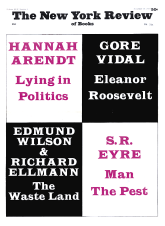In response to:
The Too Well Known from the September 2, 1971 issue
To the Editors:
David Craig’s review of Edgar Johnson’s Sir Walter Scott: The Great Unknown [NYR, Sept. 2] is both just and peevish. Professor Johnson’s style is opulent, in the most bulbous sense of that word. Anecdotes, unrevealing or unallowed to reveal, he does bead along in monotonous, almost hour by hour, succession. His estimates of Scott’s works are uncritically inflated. But why level the whole scolding tone of the review at Scott himself? Why (skilfully? inadvertently?) place these words as if they were a moral reproach: “His old age he spent tragically: writing desperate hack-work from dawn to dusk in order to pay in full a debt which was not all his fault and which most men would have settled by going bankrupt.”
Craig adds, a bit later, “…when he had to sell his Edinburgh house he was able to take with him to Abbotsford 350 dozen bottles of wine and thirty-six dozen of spirits.” But didn’t Professor Johnson too add this, and without seeming to imply that Scott was either a fool for trying to pay his debts or a hypocrite for cannily arranging to keep his whistle wet while doing so?
Perhaps because I read Craig as badly as he thinks Professor Johnson read Scott, I get the feeling that he, like Carlyle, to whose estimate of Scott he refers, has a quarrel with the Great Unknown. What is this unknown quarrel?
R. C. Stephenson
Río Piedras, Puerto Rico
David Craig replies:
Mr. Stephenson has mistaken the tone of my review, which was meant to be, not “scolding,” but (in respect of Professor Johnson) severely adverse and (in respect of Scott) fairly disparaging of his literary works and politically hostile to a society in which lawyers and writers could wine and dine enormously and own two houses while handloom weavers, for example, were working ninety-hour weeks for as little as five shillings while their children died of small-pox in their single-roomed homes. When I wrote that Scott “spent his old age tragically,” I meant to be directly compassionate; and when I mentioned the cargo of drink, I meant to draw attention to the crushing social inequality of the early nineteenth century.
This Issue
November 18, 1971



